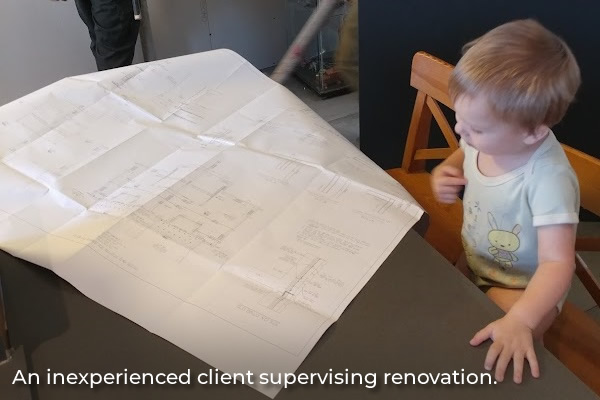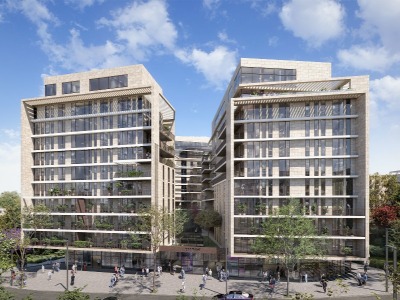
Though Israel is thousands of years old, its real estate market is booming more than ever. The Central Bureau of Statistics reported a 37% surge in residential transactions in Israel last year, with sales continuing to skyrocket. In April, it reported that home prices nationwide increased by over 16% and exceeded 17% for new construction.
As buyers flocking to newly built apart- ments drive up housing prices, a new trend has emerged among property seekers: they’re searching for less expensive, second-hand properties they can refurbish to their liking – in- creasing the value of their purchases and setting themselves up for profit down the line.
While the end result of remodeling can feel quite rewarding, the process itself can be highly intricate and confusing. But it doesn’t have to be. Learning the basics of the renovation process in Israel – from planning to permits to construction and more – can put you at an advantage. Furthermore, by partnering with qualified, experienced professionals, you can gain valuable guidance to ensure you make well-informed decisions.
Before diving into the nitty-gritty of acquiring building permits and navigating home improvement, we must first understand how construction permits are determined.
All land in Israel must comply with national and municipal zoning laws called the Tochnit Binyan Ir (“plan for urban building”), more commonly known as “Taba.” Taba dictates how a property may be developed, identifying any applicable restrictions. It designates land as residential, commercial, or communal, and dic- tates everything from base materials and height restrictions to the precise number of floors and units the property may include.
There is also a limit on how much of a prop- erty may be renovated – referred to as achuzei bniyah (a percentage of the land). If a proper- ty’s achuzei bniyah is 75%, for example, the building rights are equivalent to 75% of the square meterage of the land.
All Taba regulations and the achuzei bniyah for any plot are accessible at the offices of the
zoning and planning department of the relevant municipality.
Note that internal renovations don’t require a building permit unless they include a change to the foundation, structural beams, or exterior – such as adding a window or moving a door – or if they redistribute the division between “ikari” and “sherut” space.
●“Ikari” space, also known as the “principal” or “primary” areas, includes the kitchen, liv- ing room, restrooms, and bedrooms.
● Sherut” space refers to internal areas not in- tended for residence, such as storage rooms, bomb shelters, common hallways, etc.
The first step to acquiring a building permit in Israel may sound simple. But it is not one to be taken lightly.
Just like you need highly experienced real estate agents and lawyers to guide you through the property purchase process, it’s equally important to find a reliable architect to work alongside you throughout your renovation journey. This will be the person who evalu- ates Taba and other regulatory aspects of your renovation (such as zoning and construction laws), prepares your application for a building permit, and ultimately brings your design ideas to fruition. Therefore, you’ll want someone trustworthy and highly experienced in both architecture and the Israeli bureaucratic process.
The following are the key steps in getting your renovations off the ground:
1.To ensure your designs conform with build- ing codes, your architect will submit a re- quest to the zoning department for current Taba regulations on your property. Taba in- formation remains valid for only two years, so your architect will need to send in another application if your construction is not com- pleted in that timeframe.
2.Once your architectural plan is in line with the Taba details and finalized, you may ap- ply for a building permit by submitting an application to the local planning committee. Neighbors, along with others who may be affected by the work, will receive a copy of your application and may pose an objection.
3.Assuming the proposal is approved and you’ve paid the relevant taxes and fees, you’ll then be granted a permit to commence construction.
4.Later, once construction is complete and passes all required inspections, the local municipality will issue tofes 4 or 5 certification. These verify that your property conforms to the parameters stated in your construction permit and that the specified work has been completed.
Getting started as early as possible on your renovation plans is crucial. The approval pro- cess may take upwards of 18-24 months – up to a year for Taba and another six to twelve months for a permit. In general, the larger the municipality, the longer it may take. It’s there- fore highly recommended for your architect to consult with the municipality before filing to gauge the likelihood your application will be accepted.
Typically, building rights are granted to an entire property, not individual apartments. That means that although a building may have mul- tiple units, all of the owners are cumulatively one household from a regulatory standpoint. In fact, all construction – whether completed legally or illegally – is included in the achuzei bniyah.
Therefore, it is not uncommon for disputes to arise when some apartment owners expend a disproportionate amount of the building rights, precluding others from the possibility of undergoing construction. This scenario at times prompts owners to complete unpermitted work.
In fact, illegal construction in Israel is sur- prisingly pervasive, creating obstacles for prospective buyers. Though it is possible to purchase a property that contains unpermitted areas, the buyer will bear responsibility if the municipality later discovers the work or en- forces the building code. Consequences range from simple court fees to fines to restoring the apartment to its original conditions – but, in some cases, homeowners may find themselves in court. The key difference between purchas- ing a property with illegal renovations and do- ing such work on your own is that the former is considered a civil crime, while the latter is rendered a criminal offense.
Fortunately, Taba evolves over time so what is not allowed today may be permissible in the future. This is also part of why buyers are strongly advised to work with reputable profes- sionals – in this case, an architect or surveyor – to research what permits they can obtain for construction.
Additionally, no matter how much renova- tions improve the look and feel of the home, appraisers cannot attribute any value to ille- gally constructed areas. Many banks will even deduct value from a home with illegal con- struction, and others will deny mortgages for these properties altogether. Therefore, buyers looking to purchase these properties should be prepared for the possibility they may not obtain financing.
Established in 2005, Tama 38 is a national outline construction plan designed to strength- en residential buildings that were built before 1980 – when the national construction earth- quake standard was passed. These structures are now considered at risk of severe damage from earthquakes. Not only does Tama protect and improve quality for tenants, but it also en- tices them to protect their buildings – support- ing city infrastructure renewal overall.
The Tama project includes two proposals:
● Reinforcing the existing building structure(Tama 38/1)
● Constructing an entirely new building to re- place the old one (Tama 38/2)
The option selected typically depends on the buildings’ structural states.
Before renovations of either kind can be- gin, residents or contractors must request a construction permit from the municipality. To make this request, two-thirds of a building’s tenants must consent to undergo Tama 38/1; 85% must concur in order to be granted a Tama 38/2 permit. However, in line with all Israeli bureaucracy, this policy could change in the near future if parliament passes a proposed bill to decrease the percentage of neighbors needed.
Many buildings refurbished under the Tama plans have appended new features such as balconies and elevators, as well as upgraded lobbies, facades, and shelter rooms. Once un- dergoing the construction process, developers may also add new floors and, in some cases, are permitted to expand individual apartments by up to 25 square meters, which must include a mamad (security room).
Tenants displaced by Tama 38/2 construc- tion receive monthly rent from the developer throughout the duration of the project.
Because Tama 38/1 buildings are improved rather than brand new structures, the apart- ments built on their new floors are usually less pricey, potentially saving buyers tens or even hundreds of thousands of shekels. These build- ings are located in relatively older areas that are gradually becoming popular real estate choices – so if you’re hoping to find a home you can “make your own,” Tama neighborhoods may offer an optimal choice if you act soon.
Before undergoing renovations, buyers – both local and foreign – should understand what the process entails. Finding contractors, architects, and designers, as well as selecting every door handle, lighting fixture, and paint color is inevitably challenging – even more so from overseas. While at times it is unavoidable, buyers who can should refrain from managing renovations from afar. No matter where you are located, you’ll have to buy new appliances for your Israeli residence. That’s because, un- like in the US, all appliances must be standard size and they are typically not included with your home purchase. On the bright side, you’ll be able to choose the quality and design of your items, and you won’t have to worry whether a specific dishwasher or refrigerator will fit in the slot between your kitchen cabinets. It’s also important to bear in mind that some of the furniture suitable for American homes may not fit as well in Israeli properties.
Your real estate professional will help you factor these costs into your overall budget.
When undergoing renovations, it’s best to consult professionals every step of the way. Navigating the permit process with the Israeli bureaucracy, as well as designing and con- structing your home – and choosing finishes – requires much back and forth and the utmost meticulousness. Plus, fluency in Hebrew is critical. Finding experts to advise you on your renovation journey can ease the path to creating the property of your dreams.
RE/MAX Vision Owner, Ariyel Maresky, and Ariella Gross, a real estate intern for the com- pany, have authored a series of articles focused on guiding prospective buyers on the property acquisition process in Israel. Beyond his expe- rience as an attorney and real estate broker, Ariyel has worked in a number of leadership positions in Israeli Real estate companies be- fore bringing his innovative, entrepreneurial spirit to RE/MAX Vision Jerusalem as Broker- owner since 2017.
054-577-7509
The Jerusalem report August 22, 2022

As we step into 2024, many are left wondering: Is now the right time to invest in real estate? With interest rates fluctuating, economic uncertainties lingering, and the housing market showing signs of both resilience and volatility, it's only natural one might feel uncertain about making such a significant financial decision.

The recent months have demonstrated how deeply the spirit of volunteering and community contribution is embedded in Israeli society. Yet, alongside the impressive enrolment of many individuals and businesses during the war on Hamas, there are entities for whom community responsibility has long been a way of life.

The Israeli real estate market is entering uncharted territory in Q1 2024, with recent events, notably the 7/10 attack and the ensuing conflict in Gaza, casting a significant shadow over the buying and selling landscape.

Whether you are a first time buyer, upgrading or downsizing your current apartment, an investor or buying a vacation apartment in Israel, you are probably asking yourself whether it’s the right time to buy.
Tell us what you are looking for, and we will be happy to be of service to you